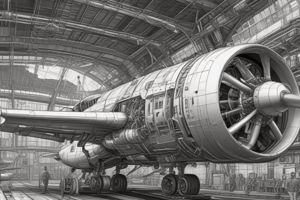Podcast
Questions and Answers
What is workmanship in the context of aircraft maintenance?
What is workmanship in the context of aircraft maintenance?
- The quality of the product
- The art of skill of a worker
- The degree of skill with which a product is made or a job done
- All of the above (correct)
What is a standard in the context of aircraft maintenance?
What is a standard in the context of aircraft maintenance?
- An informal, written procedure
- A formal, published guideline
- An agreed way of doing something (correct)
- A company's internal policy
Why is workmanship important for an AME?
Why is workmanship important for an AME?
- Because it ensures the safety of others
- Because it ensures personal safety
- Because it is a regulatory requirement
- Because people's lives depend on it (correct)
What is an important aspect of workmanship?
What is an important aspect of workmanship?
What is a key benefit of standards in aircraft maintenance?
What is a key benefit of standards in aircraft maintenance?
What is the primary purpose of tolerances in aircraft maintenance?
What is the primary purpose of tolerances in aircraft maintenance?
What is the primary purpose of calibration in aircraft maintenance?
What is the primary purpose of calibration in aircraft maintenance?
What is an important aspect of standards in aircraft maintenance?
What is an important aspect of standards in aircraft maintenance?
What is the importance of checking the expiry date/shelf life of a product?
What is the importance of checking the expiry date/shelf life of a product?
What should be done with mixed two-pack sealants after use?
What should be done with mixed two-pack sealants after use?
What is the purpose of dimensions on an aircraft drawing?
What is the purpose of dimensions on an aircraft drawing?
What does the double prime symbol (″) represent in drawings and dimensional specifications?
What does the double prime symbol (″) represent in drawings and dimensional specifications?
What is tolerance in the context of aircraft parts?
What is tolerance in the context of aircraft parts?
What determines the acceptability of a fabricated aircraft part?
What determines the acceptability of a fabricated aircraft part?
What is the purpose of a title block on an aircraft drawing?
What is the purpose of a title block on an aircraft drawing?
What are the two ways of placing dimensions on an aircraft drawing?
What are the two ways of placing dimensions on an aircraft drawing?
What is the purpose of a 'Shadow Board' in a workshop?
What is the purpose of a 'Shadow Board' in a workshop?
What is the main purpose of 'Tool Control' in a workshop?
What is the main purpose of 'Tool Control' in a workshop?
What is the purpose of 'Tolerances and Allowances' in aircraft maintenance?
What is the purpose of 'Tolerances and Allowances' in aircraft maintenance?
What is the purpose of 'Calibration Standards' in aircraft maintenance?
What is the purpose of 'Calibration Standards' in aircraft maintenance?
What is the purpose of 'Materials Storage' in a workshop?
What is the purpose of 'Materials Storage' in a workshop?
What is the purpose of 'Workshop Practices' in aircraft maintenance?
What is the purpose of 'Workshop Practices' in aircraft maintenance?
What is the purpose of 'Dimensions, Tolerances, and Allowances' in aircraft maintenance?
What is the purpose of 'Dimensions, Tolerances, and Allowances' in aircraft maintenance?
What is the purpose of 'Tool Identification' in a workshop?
What is the purpose of 'Tool Identification' in a workshop?
What is one of the benefits of standards to business?
What is one of the benefits of standards to business?
What type of standards are only used by the organisation that developed them?
What type of standards are only used by the organisation that developed them?
Who develops national standards in Australia?
Who develops national standards in Australia?
What is the purpose of using the correct tools in aircraft maintenance?
What is the purpose of using the correct tools in aircraft maintenance?
What is the result of not properly using and caring for tools?
What is the result of not properly using and caring for tools?
Why is it important to choose the correct tools for a job?
Why is it important to choose the correct tools for a job?
What is the result of not having the proper tools and knowledge of how to use them?
What is the result of not having the proper tools and knowledge of how to use them?
What is the importance of preventative maintenance in tool care?
What is the importance of preventative maintenance in tool care?
What is a crucial aspect of maintaining a safe product for the customer?
What is a crucial aspect of maintaining a safe product for the customer?
What should be available for all materials used in the workshop?
What should be available for all materials used in the workshop?
Where should flammable materials be stored when not in use?
Where should flammable materials be stored when not in use?
Why is it important to comply with the MSDS for individual materials?
Why is it important to comply with the MSDS for individual materials?
What is a specific requirement for storing certain aircraft sealants?
What is a specific requirement for storing certain aircraft sealants?
What should be designated in the event a missing tool is not found?
What should be designated in the event a missing tool is not found?
What is a critical aspect of maintaining a safe workshop environment?
What is a critical aspect of maintaining a safe workshop environment?
Why is it important to have a clear procedure for reporting missing tools?
Why is it important to have a clear procedure for reporting missing tools?
Flashcards are hidden until you start studying
Study Notes
Workshop Practices
- Learning objectives include describing the correct care of tools, control of tools, and use of workshop materials, as well as analyzing dimensions, allowances, and tolerances.
Standards of Workmanship
- Workmanship refers to the degree of skill with which a product is made or a job done.
- Factors contributing to workmanship include:
- The art of skill of a worker
- The quality of the product
- The product or result of the labor and skill of a worker
- Attitudes of the AME, team, and organization
- Duty of care (self, others, and equipment)
- Working done according to a standard
- Workmanship is important for an AME as it directly affects the safety of passengers and crew.
- Standards are an agreed way of doing something, which can be formally recorded and published or informally followed as a company's procedure.
Tool Control
- Tool control includes:
- Care of tools
- Tool identification
- Tool inventory
- Missing tool reporting
- Individual toolboxes
- Shadow boards
- Tool control and foreign object damage
Calibration
- Calibration includes:
- Calibration of tools and equipment
- Calibration standards
- Precision tools and test equipment
- Measuring equipment
- Torque wrenches
- Pressure gauges and transmitters
- Micrometers
- Calibration tags
Hand Tools
- Hand tools include:
- Hammers
- Punches
- Chisels
- Files
- Sheet metal shears
- Cutting pliers
- Screwdrivers
- Spanners
- Other common hand tools
- Each type of hand tool has its own characteristics, uses, and precautions.
Power Tools
- Power tools include:
- Drilling machines
- Electric power tools (wired and cordless)
- Pneumatic power tools
- The riveting gun and set
- Soldering irons
- Each type of power tool has its own characteristics, uses, and precautions.
Measuring Tools
- Measuring tools include:
- Torque wrenches
- Micrometers
- Vernier calipers
- Dial indicators
- Bore gauges
- Digital instruments
- Go/No-Go gauges
- Each type of measuring tool has its own characteristics, uses, and precautions.
Engineering Drawings, Diagrams and Standards
- Engineering drawings and diagrams include:
- Symbols and abbreviations
- Types of drawings (e.g., working drawings, exploded views, sectional drawings)
- Methods of illustrating (e.g., orthographic projection, isometric drawings)
- Title blocks and bills of material
- Dimensioning and tolerancing
- Manufacturers' publications and standards
- Understanding engineering drawings and diagrams is essential for aircraft maintenance.
Fits and Clearances
- Fits and clearances include:
- Classes of fit (e.g., clearance fits, interference fits, transition fits)
- Tolerances and allowances
- Calculating tolerances and clearances
- Inspecting for maintenance limits
- Understanding fits and clearances is crucial for aircraft maintenance.
Springs, Bearings, and Transmissions
- Springs, bearings, and transmissions include:
- Inspection and testing methods
- Maintenance and repair procedures
- Lubrication and storage procedures
- Types of bearings and transmissions
- Understanding springs, bearings, and transmissions is essential for aircraft maintenance.
Aircraft Control Cables
-
Aircraft control cables include:
- Cable systems and construction
- Cable termination and inspection
- Cable installation and adjustment
- Turnbuckle locking and travel adjustment
-
Understanding aircraft control cables is crucial for aircraft maintenance.### Sealants
-
It is crucial to check the expiry date/shelf life before using a product to maintain its integrity.
-
After use, ensure the container is properly sealed to enable re-use at a later date.
-
Mixed two-pack sealants need to cure completely before disposal, and then they can be disposed of in accordance with local council/authority regulations.
Dimensions, Tolerances, and Allowances
- Aircraft drawings are dimensioned using a reference edge from which all dimensions are made.
- Dimensions can be placed on an aircraft drawing in two ways: perpendicular to the dimension lines or parallel to the bottom of the drawing.
- The nominal dimension of an aircraft part is the size stated on the drawing.
- A part fabricated from aircraft sheet metal has a maximum and a minimum allowable size.
- Tolerance is the difference between the nominal dimension and the upper and lower limits of size.
Standards
- Standards provide benefits to business and individuals, including accurate measurements, lowered production costs, improved product performance, and more.
- There are three types of standards: private, national, and international.
- National standards are produced by a country's National Standards Body (NSB) and are often enforced by regulation.
- International standards are produced by the International Organisation for Standardisation (ISO).
Tool Control
- Tools are designed to make a job easier and enable efficient work, but they must be properly used and cared for.
- Without the proper tools and knowledge of how to use them, time is wasted, efficiency is reduced, and injuries may occur.
- Tools are expensive and vital equipment, and a little preventative maintenance can prolong their usefulness.
- A clear procedure should be in place for reporting missing tools, including how often tools need to be inventoried and the steps to be taken once a missing tool is reported.
Workshop Practices
- Many types of workshop materials are available, including greases, oils, solvents, sealants, contact cements, paints, and paint strippers.
- A Material Safety Data Sheet (MSDS) and a specification sheet should be available for all materials used in the workshop.
Material Storage
- Storage of flammable materials is crucial for safety and maximum usage.
- Flammable materials should be stored in an appropriate flammable storage facility when not in use.
- Some materials are highly toxic, and it is vital to comply with the MSDS for individual materials, including using PPE and working in a well-ventilated environment.
- Many aircraft sealants require refrigerated storage to ensure they stay usable for their shelf life.
Studying That Suits You
Use AI to generate personalized quizzes and flashcards to suit your learning preferences.




